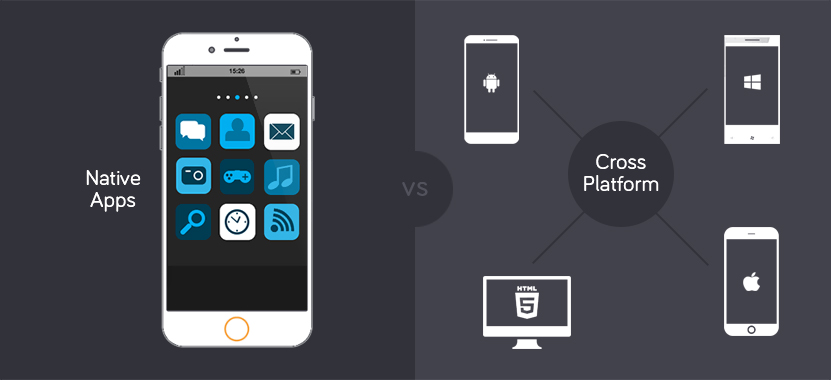Native App vs Cross-Platform App Development
The global mobile application income was around $70 billion out of 2015 which is anticipated to relatively triple to $190 billion by 2020. That is, as we move further into 2018, we are really experiencing a standout amongst the most explosive development periods of the business and to not investigate it is miss an open door that no business can manage.
While the advantages of having a mobile application can't be clarified in the extent of this article as it requires a more itemized talk, we will here attempt to address the second most puzzling question that organizations confront Native versus Cross-platform applications.

Native Application
As you may know, with regards to mobile platform, there is a virtual duopoly with iOS and Android representing more than 99% of the gadgets. Given that both these platforms yield colossal impact and resources, the picture isn't probably going to change at any point in the near future. Thus, while native applications (by definition) mean applications worked for a specific platform utilizing its specific SDK, we will here keep our discussion limited to these two.
Language
Swift and Objective-C for iOS application development
Java, C++, and Kotlin for Android application development
Framework
Xcode for iOS
Android Studio for Android
Basically, settling on native application development definitely limit the quantity of tools and technologies that developers can utilize. In any case, each of those tools, technologies, libraries, components, or anything else that developers deploy are altogether tried by the biggest enterprises and are exceedingly enhanced to convey best-in-class execution and user experience. Also, given that the producers of both Android and iOS have plentiful control over the hardware too, native applications can convey features that require profound mix with gadget hardware like payment features includes that utilize NFC, Augment Reality utilizing camera, among numerous others.
Advantage
Fantastic User Experience
Exceedingly better performance
More extensive feature catalog
Better integration in the platform ecosystem
Disadvantage
Consumes lots of resources and time
Costly to build
Cross-Platform Application Development
Cross-platform application development is considerably more broadened that native application development, not simply as far as the bunch of technologies included, yet in addition the development method. Comprehensively, there are two ways that the cross-platform applications can be made 1. Utilizing bound together APIs, which are basically the combination of both Android and iOS APIs and along these lines, can be conveyed on both the platforms; 2. Making web views of the application and after that wrapping them in native component for platform specific deployments.
For both the cases, the development theory continues as before compose once, run anywhere. That is, developers need to make a single codebase, which is then sent to various platforms with almost no changes.
Language
HTML, CSS, JavaScript, TrueScript, AngularJS, among numerous others
Framework
Xamarin, Ionic, Native Script, React Native, PhoneGap, among numerous others
Basically, mixture applications can be made utilizing an immense range of tools and technologies that numerous developers definitely know, accordingly rearranging the expectation to learn and adapt. In addition, the vast majority of those tools are for the most part open-source that additionally brings the "free" tag and large community support. The most unmistakable feature of cross-platform application development is that since developers need to make a single codebase for all platforms, the charging hours are radically decreased, cutting down the cost of use also.
Advantage
Quick Deployment
Low Cost
Native like UI
Disadvantage
User Experience marginally debased
A considerable lot of the native features aren't accessible or arrive later than native APIs
Final Words
As you may have seen, the partition amongst native and cross-platform applications isn't as noticeable as by and large accepted. All things considered, in the extreme competition nowadays, even the minutest points of interest can possibly shape the fate of any application and by augmentation, business. Furthermore, this is the motivation behind why the choice to pick between the two is intrinsically installed in the extraordinary business requirement and there is no supreme champ.


